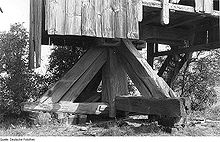Trestle (mill)

The trestle of a post mill is the arrangement of the main post, crosstrees and quarterbars that form the substructure of this type of windmill.[1] It may or may not be surrounded by a roundhouse. Post mills without a roundhouse are known as open trestle post mills.[2]

A trestle mill is a variety of smock mill, usually without weatherboards, formerly used for drainage in the Norfolk Broads.[3] Examples can be found at Horning,[4] Ludham[5] and St Olaves.[6]
A well preserved example of a timber crosstree, from the trestle of a medieval windmill, was excavated by archaeologists at Humberstone, near Leicester, in 2007.[7]
References
- ^ Farries 1982, pp. 26–27.
- ^ Coles Finch 1933, p. 290.
- ^ Smith 1990, p. 15.
- ^ Smith 1990, pp. 28, 55.
- ^ Smith 1990, pp. 30, 56.
- ^ Smith 1990, p. 46.
- ^ Thomas 2008.
- Sources
- Farries, Kenneth G. (1982). Essex Windmills, Millers and Millwrightes. Vol. Two: A Technical Review. London and Edinburgh: Charles Skilton. ISBN 0-284-98637-2.
- Smith, Arthur C. (1990). Drainage Windmills of the Norfolk Marshes. Stevenage: Arthur Smith Publication. ISBN 0-9515766-0-7.
- Coles Finch, William (1933). Watermills and Windmills. London: C. W. Daniel.
- Thomas, J. (2008). "Excavation of a Medieval Post-Mill Mound at Manor Farm, Humberstone" (PDF). University of Leicester Archaeological Services. Retrieved 4 December 2022.
